Veteran Instincts: Teaching the next generation of scientists
MSU researchers are teaching the next generation of scientists how to place their stamp on research, find success in academia

The scientific disciplines have never been a place for the faint of heart. Between securing funding, meeting publication demands, and balancing the responsibilities of teaching, research and outreach, the realities of being a university scientist can be daunting, especially for newcomers. Fortunately for those starting out in academia, the advice of colleagues who have already passed through the metaphorical fire is never more than a few steps away.
Climate change, food security, overpopulation, clean water and antibiotic resistance are just a few of the important issues facing the future. Michigan State University (MSU) AgBioResearch has more than 325 researchers across numerous scientific disciplines pursuing solutions to these problems. Their breadth of experience and expertise provides special insight into their respective fields and strengthens the advice that they frequently give to young faculty members following similar paths.
Get in for the right reasons
The next generation of researchers has to be ready not only for the rigors of their academic disciplines but mentally prepared for the other demands that come with the territory. George Smith, a professor in the MSU Department of Animal Science and co-director of the Reproductive and Developmental Sciences Program, says it’s more crucial than ever that young scientists have passion and drive to persevere in their chosen fields.
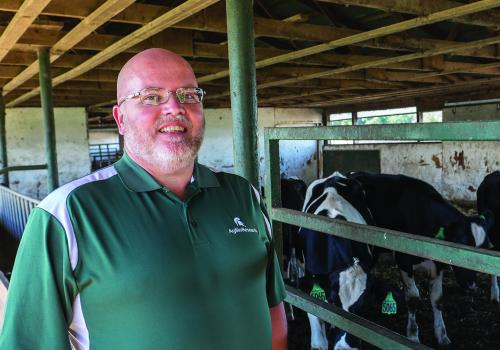 “The reality of a career in science now is that it’s tough,” said Smith, also associate director of MSU AgBioResearch. “You need to love what you do and be competitive by nature. When students come to me and express interest in going to grad school and pursuing a research career, I want to know their motivation -- their goal.
“The reality of a career in science now is that it’s tough,” said Smith, also associate director of MSU AgBioResearch. “You need to love what you do and be competitive by nature. When students come to me and express interest in going to grad school and pursuing a research career, I want to know their motivation -- their goal.
“If it’s because they aren’t sure what else to do, that’s the wrong answer. But if they have the passion for it, if they have the need to chase answers to questions, then they need to move forward to be the best they can be and not look back.”
Since joining the MSU Department of Horticulture 28 years ago, Rebecca Grumet continues to teach as well as conduct research on cucurbit genetics and biotechnology risk assessment. She recalls starting out in her career in 1987.
“Idealism drew me into it,” said Grumet, now a professor. “When I was in high school in the ‘70s, people were very concerned about predicted world food shortages. Norman Borlaug, the father of the Green Revolution, was a hero to me. I wanted to be involved in the kind of work he was, work that really mattered.”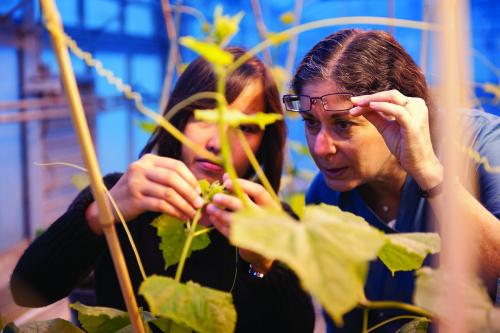
That early inspiration was instrumental in determining the course of her future. It gave Grumet the motivation she needed throughout her educational and academic career. And it’s what she continues to draw on today as she tackles contemporary issues such as genetically modified crops and biodiversity. Finding projects that are personally exciting is important because those are the projects to which researchers are willing to give their all, she added.
Connecting with colleagues
Though Grumet had great passion for her career, she admits she needed a strong support system.
“Excellent colleagues are one of the keys to excellent research,” she said. “Some of the best work I’ve ever been a part of has been as a member of a team.”
Advancing the frontiers of knowledge, scientists and scientific research have only uncovered greater unknowns. With the questions now looming larger than ever, often on a global scale, the emphasis on multidisciplinary and multi-institutional research has only increased.
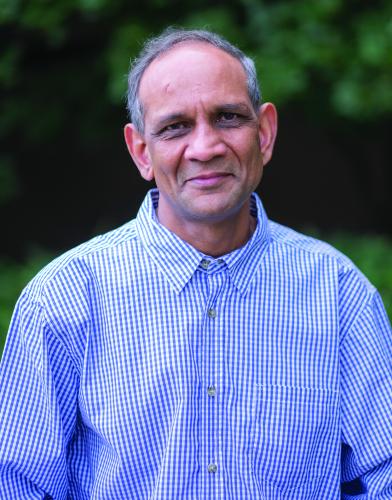 Karim Maredia has spent much of his time after coming to MSU in 1989 forging research partnerships with scientists across the United States and around the world. He counsels new faculty members to find and participate in professional networks that reflect their research interests to build the collaborative partnerships upon which many grants are now based.
Karim Maredia has spent much of his time after coming to MSU in 1989 forging research partnerships with scientists across the United States and around the world. He counsels new faculty members to find and participate in professional networks that reflect their research interests to build the collaborative partnerships upon which many grants are now based.
“One of the most important things a new faculty member can do is build or become part of a network of fellow researchers,” said Maredia, professor in the Department of Entomology and program director of the World Technology Access program through the Institute of International Agriculture. “Networks help you connect with other scientists and open a lot of doors to new opportunities.”
Maredia was drawn to MSU, in part, because of its numerous international programs. Capitalizing on that, he and his colleagues started additional programs to bring researchers from around the world to MSU for one- or two-week summer training courses. In the past 25 years, his programs have helped train more than 2,000 scientists.
“Now, when we write proposals for big grants and team projects, we don’t have to look for partners -- we already have them because of the network of researchers we’ve built.”
Working as a team also provides experience working alongside leaders in the field.
“As a faculty member, you want to be the best, be as hard-working and dedicated as you can be, but you also want to be surrounded by the best,” Maredia said. “That way, you’re working with the best people at the best institutions. Publishing with them can only help your skills and your career.”
Having joined the MSU College of Veterinary Medicine in 2011, Bo Norby, associate professor in the Department of Large Animal Clinical Sciences, has already begun to distinguish himself in his field. In June, Norby was invited to attend the White House One Health Forum on Antibiotic Stewardship, a national effort to combat the development of pathogen resistance to conventional drugs. He attributes such successes, in part, to meeting supportive colleagues and heeding their advice.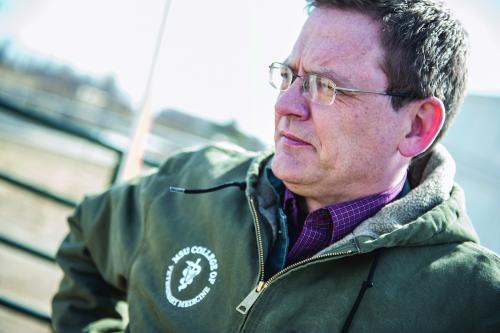
“You need to have good mentors,” he said. “It doesn’t have to be someone you work closely with, but you need to find people willing to teach you the ins and outs of being a new faculty member.”
A good mentor, Norby said, can help a new scientist make connections with leaders in his/her department, college and/or field. Mentors can also be important advocates for new faculty members as they begin their ascent through the ranks of tenure and promotion by helping them find a place within large multidisciplinary projects.
“A good mentor can help you appraise the projects you’re becoming involved in and make sure there’s a place in them carved out for you that you can make your own,” Norby said. “Especially when you aren’t the principal investigator on a project, it’s important for your career that you have something at the end of it that’s yours.”
Think big, and plan accordingly
One of the most recent changes is that the funding climate for scientific research has become increasingly competitive. Because more researchers are vying for fewer grants, it’s important for new faculty members to learn what the agencies providing the funding are looking for. The key to success in this new atmosphere is to understand what the most important topics are and be prepared to address them.
“Whichever field you’re in, don’t be afraid to think big,” Norby said. “Think of the topics and areas of interest that will have a huge impact, where your research can likewise make an impact.”
Norby advocates scheduling time each week, whether in a large block once a week or in small blocks of time each day, to write, consider research and think about the field ahead. By building an understanding of future direction, a researcher can stay ahead of the game.
“You want to challenge yourself, be aware of the direction that your field is moving and prepare yourself to work on the frontier of that change,” Grumet said.
Thinking big does not, however, mean ignoring small projects. Pursuing small research grants can help build a scientist’s reputation and skills, improving the chance of securing larger ones in the future.
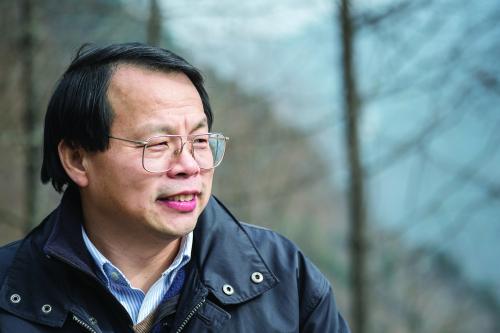 “Of course, everyone wants multimillion-dollar grants, but you have to be willing to start with smaller ones,” Maredia said. “I wasn’t getting Gates Foundation grants in my first year as a faculty member -- it took me years to build up my reputation and credibility. Taking on $25,000 to $50,000 grants and producing good results from them was how I did that.”
“Of course, everyone wants multimillion-dollar grants, but you have to be willing to start with smaller ones,” Maredia said. “I wasn’t getting Gates Foundation grants in my first year as a faculty member -- it took me years to build up my reputation and credibility. Taking on $25,000 to $50,000 grants and producing good results from them was how I did that.”
The importance of understanding research problems from multiple perspectives should not be overlooked. Jianguo ”Jack” Liu, a 30-year veteran of systems integration, the synthesis of ecology and social sciences, cites the significance of seeing the whole picture of a research subject rather than just one aspect.
“When I was starting out, there was little systems integration. Ecologists were still focused on ‘natural systems’, even though humans had increasingly affected natural ecosystems and no place on Earth was exempt from human impacts,” said Liu, University Distinguished Professor of fisheries and wildlife and director of the Center for Systems Integration and Sustainability. “Likewise, social scientists were focusing on human dimensions with little attention to the natural world. This separation limited the findings of both disciplines, but by combining their expertise, they have been able to find new insights.”
The university is there to help
The pressures facing a faculty member, particularly someone new, are very high. Balancing research, teaching, outreach and administrative responsibilities is challenging for even the most experienced professor. To help new faculty members thrive in the face of sometimes daunting realities, MSU departments have created faculty support systems.
“We do everything we can to help new faculty be successful,” said James Kells, chair of the Department of Plant, Soil and Microbial Sciences (PSMS). “This is not a sink-or-swim environment. We have developed as effective a support system as we possibly can to maximize the opportunities our faculty members have to be successful.”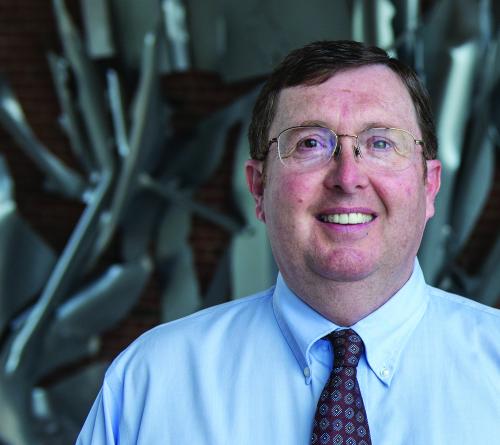
One of the key responsibilities of department chairs such as Kells is to ensure that all researchers have the necessary resources and support to meet the high expectations that accompany their positions. Whether making sure that they have enough lab, field or greenhouse space, providing new faculty members with initial funding to get research started, or simply providing encouragement and advice, their role is essential to helping new faculty succeed.
New PSMS faculty members are also assigned a mentor committee consisting of seasoned researchers who have already been through the tenure process. Meeting at least once a year but as often as the members like, the committee gives advice and provides input on new research opportunities.
“You can’t just hire someone, give them a desk and say, ‘OK, now go do great things,’” Kells said. “You have to give them a starting point.”
The benefits of mentorship are greatly appreciated.
“If you’re a new faculty member, don’t be afraid of talking to your mentors, your department chair or the leadership in your college,” Norby said. “They’re there to help you, and you can learn a great deal from them.”
MSU AgBioResearch provides further support for its researchers and their programs.
“We play a critical role in working with the departments and partner colleges in helping them invest in new talent so that they can address the complex problems that are relevant to citizens of Michigan, the U.S. and beyond,” Smith said. “Our role is very prominent in supporting the infrastructure that allows our scientists to do what they do very well. Our faculty members are trying to solve problems, and we’re trying to support them so they can have a broader impact.”
The future looks bright
With support from their institution, an eagerness to collaborate and a passion for science and problem solving, the next generation of scientists stand poised to carry on the good work done by their forebears and deliver solutions to the planet’s most pressing concerns.
Technology will continue to advance, but it remains up to researchers to apply it to important future research areas.
“I think it’s fair to say that, while new technology has provided for huge advancements, the challenges we’ll be dealing with in the future will be no less significant,” Smith said. “Instead, those advancements have created new and unique opportunities to address emerging fundamental problems on many fronts. I am confident our current and next generation of scientists are poised to address and solve such complicated problems.”
Cross-disciplinary collaboration will continue to be crucial, and new scientists are more prepared than ever to collaborate with and understand the approaches of their fellow researchers.
“My hopes for the next generation of scientists are that they remain bold and transform traditional disciplinary paradigms,” Liu said. “Addressing global challenges requires generalists who can cross disciplinary boundaries and lead teams of disciplinary experts to solve both fundamental and applied problems.”
Confronting and solving the challenges of the future will not only help the planet -- it will also give the scientists a chance to make their mark on their respective fields.
“The young people coming into science today are very lucky,” Maredia said. “They live in a world that’s become very small; information is at their fingertips. They can do a lot with the technology and resources that are available to them. Food security, rising populations -- these are problems, but I see them also as opportunities -- for them to shine in their own right.”



 Print
Print Email
Email





